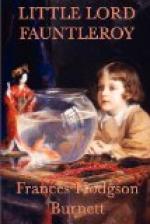So when he knew his papa would come back no more, and saw how very sad his mamma was, there gradually came into his kind little heart the thought that he must do what he could to make her happy. He was not much more than a baby, but that thought was in his mind whenever he climbed upon her knee and kissed her and put his curly head on her neck, and when he brought his toys and picture-books to show her, and when he curled up quietly by her side as she used to lie on the sofa. He was not old enough to know of anything else to do, so he did what he could, and was more of a comfort to her than he could have understood.
“Oh, Mary!” he heard her say once to her old servant; “I am sure he is trying to help me in his innocent way—I know he is. He looks at me sometimes with a loving, wondering little look, as if he were sorry for me, and then he will come and pet me or show me something. He is such a little man, I really think he knows.”
As he grew older, he had a great many quaint little ways which amused and interested people greatly. He was so much of a companion for his mother that she scarcely cared for any other. They used to walk together and talk together and play together. When he was quite a little fellow, he learned to read; and after that he used to lie on the hearth-rug, in the evening, and read aloud—sometimes stories, and sometimes big books such as older people read, and sometimes even the newspaper; and often at such times Mary, in the kitchen, would hear Mrs. Errol laughing with delight at the quaint things he said.
“And; indade,” said Mary to the groceryman, “nobody cud help laughin’ at the quare little ways of him—and his ould-fashioned sayin’s! Didn’t he come into my kitchen the noight the new Prisident was nominated and shtand afore the fire, lookin’ loike a pictur’, wid his hands in his shmall pockets, an’ his innocent bit of a face as sayrious as a jedge? An’ sez he to me: ‘Mary,’ sez he, ’I’m very much int’rusted in the ‘lection,’ sez he. ’I’m a ‘publican, an’ so is Dearest. Are you a ‘publican, Mary?’ ‘Sorra a bit,’ sez I; ‘I’m the bist o’ dimmycrats!’ An’ he looks up at me wid a look that ud go to yer heart, an’ sez he: ‘Mary,’ sez he, ‘the country will go to ruin.’ An’ nivver a day since thin has he let go by widout argyin’ wid me to change me polytics.”




